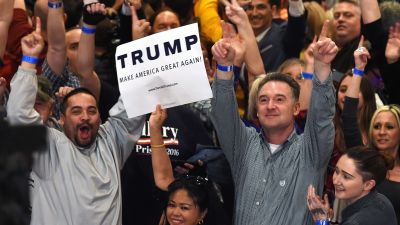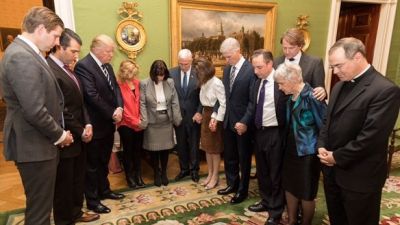
Members of the congregation kneel in prayer during a Sunday service at Trinity Lutheran Church on Sept. 24, 2017 in Hixson, Tennessee. (Photo by Melanie Stetson Freeman/The Christian Science Monitor via Getty Images)
The unlikely victory of Democrat Doug Jones over Republican Roy Moore in the rollercoaster Senate election in deep-red Alabama was remarkable for several reasons. On the national stage, there are a number of lessons to be drawn. Candidate quality and a good old-fashioned ground game still matter. President Trump’s influence has limits in state and local races. And the strong turnout among Democrats, particularly among African-Americans, is yet another sign that the 2018 midterms may be a wave election.
But the race also cast important light on the state of white evangelical political ethics. It provided further confirmation that white evangelical Protestants have exchanged principles for partisanship, and political ethics for tribal loyalty.
Moore presented himself as the only candidate standing up for God and Christian principles, even as he faced multiple allegations of inappropriate sexual behavior with teenage girls while he was in his 30s, talked about the era of slavery as a time when America was great and families were more stable, referred to native Americans and Asians as “reds and yellows,” and said that getting rid of the constitutional amendments after the 10th would “eliminate many problems” — amendments that include the 13th, which abolished slavery, and the 19th, which gave women the right to vote.
But his opponent, Doug Jones, distinguished himself as a prosecutor who achieved convictions for Ku Klux Klan members who had bombed a black Birmingham church and escaped justice for four decades. He is a regular churchgoer who drives the church bus to pick up elderly people who can’t get to services on their own.
But beyond the shared Christian faith of the candidates, attempting to draw a line between a Republican Party that stands for Christian principles and a Democratic Party that doesn’t is ludicrous. In Alabama, 88 percent of Republicans identify as Christian, but so do 81 percent of Democrats. The question in this race was never whether, but which, Christians were going to show up at the polls.
White evangelical voters in Alabama turned out to vote. According to the exit polls, they constituted 44 percent of Alabama voters, comparable to the 47 percent of voters they represented in 2012, the most recent exit poll data we have. And they pulled the lever for Moore at levels comparable to their support for Trump in 2016 (80 percent for Moore, 81 percent for Trump); only 18 percent of white evangelical Protestants voted for Jones, and 2 percent cast write-in ballots for a third candidate. In other words, Jones did not win because white evangelicals stayed home or had second thoughts. He won despite steady white evangelical support for Moore, thanks to heavy turnout primarily of (overwhelmingly Christian) black voters and younger white voters in counties with universities and larger cities.
So how do we understand the overwhelming white evangelical support for candidates like Trump and now Moore?
First and foremost, evangelical support for Trump and Moore is strong evidence of the power of negative partisanship. There is a growing mountain of evidence in political science that what drives partisanship in the US is not a love for one’s own party, but a hatred of the other party. We can see this on display in white evangelicals’ attitudes toward the Democratic Party. According to the Public Religion Research Institute’s (PRRI) recent American Values Survey, approximately 8 in 10 white evangelical Protestants say that the policies of the Democratic Party are misguided, including nearly half (45 percent) who say Democratic policies are so misguided they pose a serious threat to the country.
The pull of partisan tribalism is so strong, in fact, that it often creates two separate realities. For example, in the Alabama Senate race, when asked to evaluate the allegations by multiple women against Moore, 89 percent of Jones voters believed they were true, but 86 percent of Moore voters believed they were false. Nationally, there is evidence that the relentless attacks on the media by the Trump campaign are taking root among rank-and-file Republicans, allowing them to dismiss media coverage that casts their candidate in a bad light. Only 17 percent of Republicans, compared to two-thirds (66 percent) of Democrats, believe reporters are trying to report the news fairly and accurately; by contrast, nearly 8 in 10 (79 percent) Republicans believe most reporters have a personal or political agenda.
Partisan tribalism has now fully turned evangelicals’ political ethics on its head. White evangelicals spent decades creating the “values voters” brand that emphasized adherence to principles and put a premium on candidates’ character. In the wake of the Clinton-Lewinsky scandal, for example, conservative Christian activist Gary Bauer began his own bid for the presidency in 1998 with an ad that declared that the scandal “taught our children that lying is okay, that fidelity is old-fashioned and that character doesn’t count.” It ended with the following appeal:
Every American parent’s job has been made more difficult. The virtue deficit has grown. Mr. President, it is time for you to put our country and our children first. It is time for you to resign.
As recently as 2011, PRRI polling suggested that character still counted among white evangelicals when evaluating candidates. When asked whether a candidate who had committed an immoral act in their private life could nonetheless behave ethically and perform their duties in their public life, only 30 percent of white evangelicals agreed this was possible. But when this question was asked again in 2017, with Donald Trump at the top of the ticket, a whopping 72 percent of white evangelicals agreed.
White evangelicals’ support for Trump and Moore clearly demonstrates that what counts most now is that the Republican Party wins — or more precisely, that the Democratic Party loses. But this commitment surely doesn’t follow from a religious worldview or a principled political ethic. Roy Moore may have lost the race, but it is white evangelicals who seem to have lost their way.




